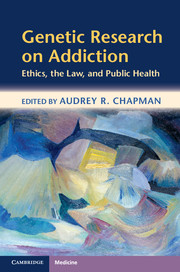Book contents
- Frontmatter
- Contents
- Contributors
- Preface
- Section 1 Introduction
- Section 2 Research ethics
- 4 Improving the informed consent process in research with substance-abusing participants
- 5 Ethical considerations in genetic research with children affected by parental substance abuse
- 6 Protecting privacy in genetic research on alcohol dependence and other addictions
- 7 Certificates of Confidentiality: Uses and limitations as protection for genetic research on addiction
- 8 Ethical issues in human genomic databases in addiction research
- 9 Should addiction researchers accept funding derived from the profits of addictive consumptions?
- 10 Ethical issues related to receiving research funding from the alcohol industry and other commercial interests
- Section 3 Translating addiction research
- Section 4 Conclusions
- Index
- References
5 - Ethical considerations in genetic research with children affected by parental substance abuse
from Section 2 - Research ethics
Published online by Cambridge University Press: 05 September 2012
- Frontmatter
- Contents
- Contributors
- Preface
- Section 1 Introduction
- Section 2 Research ethics
- 4 Improving the informed consent process in research with substance-abusing participants
- 5 Ethical considerations in genetic research with children affected by parental substance abuse
- 6 Protecting privacy in genetic research on alcohol dependence and other addictions
- 7 Certificates of Confidentiality: Uses and limitations as protection for genetic research on addiction
- 8 Ethical issues in human genomic databases in addiction research
- 9 Should addiction researchers accept funding derived from the profits of addictive consumptions?
- 10 Ethical issues related to receiving research funding from the alcohol industry and other commercial interests
- Section 3 Translating addiction research
- Section 4 Conclusions
- Index
- References
Summary
Research done from several different perspectives over more than 40 years indicates that children with a substance-abusing parent are at risk for an array of poor developmental outcomes. Investigations based on family-study methods have clearly documented the aggregation of substance use and psychiatric difficulty within family systems affected by substance abuse (e.g., see Rounsaville et al., 1991; Bierut et al., 1998; Merikangas et al., 1998). Comparative, longitudinal studies of children with a substance-abusing parent followed from early childhood through adolescence into early adulthood also document substantial risk for intergenerational transmission of substance abuse that seems to increase as the density of substance abuse within the family increases (e.g., see Chassin et al., 1996; Zhou et al., 2006). Moreover, research based on the principles of behavioral genetics has clearly documented genetic liability for problematic use of substances (e.g., see Tsuang et al., 1998; Hicks et al., 2004; Kendler et al., 2003; Rhee et al., 2003), and molecular research has begun to identify specific markers of that genetic risk (e.g., see Uhl et al., 2008; Bierut et al., 2010).
Given the empirical data documenting familial risk, researchers (e.g., see Tarter et al., 1999; Vanyukov et al., 2003) have begun to define conceptual models of intergenerational transmission that explain how genetic liability and psychosocial stress interact over time to promote the aggregation of substance abuse across generations. Because developmental precursors to chronic substance abuse are present surprisingly early in childhood, high-risk use of substances typically begins during early adolescence, and substance-use disorders often emerge during middle to late adolescence (Schulenberg and Maggs, 2008), research designed to untangle genetic influences on risk must include children. Given the current state of the science, complex questions about which children with a substance-abusing parent are affected across generations cannot be answered without examining the genetic liability and developmental trajectory of children known to be at risk.
- Type
- Chapter
- Information
- Genetic Research on AddictionEthics, the Law, and Public Health, pp. 61 - 83Publisher: Cambridge University PressPrint publication year: 2012



